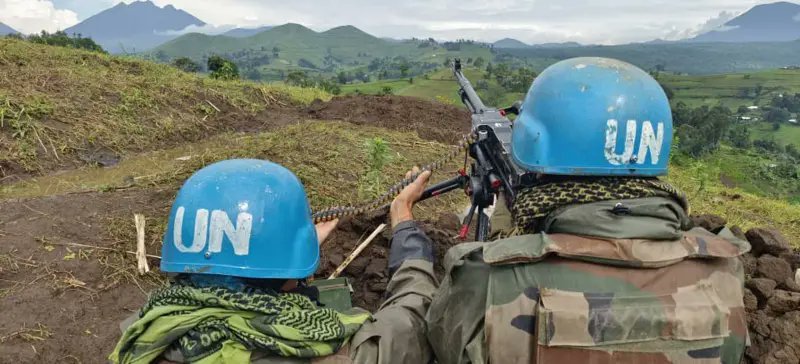The United Nations Organization Stabilization Mission in the Democratic Republic of Congo (MONUSCO) has confirmed its involvement in military operations alongside the Congolese army, utilizing heavy artillery and airstrikes to target M23 rebel positions. The joint offensive aims to neutralize the rebels’ military equipment and restore stability in conflict zones.
The announcement follows fierce fighting that erupted on January 23 between M23 forces and the Congolese military near the city of Sake and its surroundings, including Kibumba in Nyiragongo territory. Thousands of civilians have reportedly been displaced as the violence escalates.
In a statement, MONUSCO reiterated its alignment with the UN Secretary-General’s call for the resumption of peace talks. The mission stressed the need for a “durable and final solution” to the conflict, urging all parties to prioritize dialogue over further violence.
Stalled Luanda Peace Process
The referenced peace talks, known as the Luanda Process, began in 2022 under the mediation of Angolan President João Lourenço, bringing together Rwanda and the DRC. However, progress has been hindered by M23’s exclusion from direct participation. The group has criticized the process for making decisions without its input, which it views as essential for addressing the grievances of its members.
The negotiations faced a significant setback in December 2024 due to disagreements between Rwanda and the DRC. Key sticking points included M23’s demand for direct talks with the Congolese government. Rwanda argued that a sustainable resolution to the conflict would require addressing three critical issues: dismantling the Democratic Forces for the Liberation of Rwanda (FDLR), lifting Rwandan border defense measures, and engaging M23 in direct negotiations.
Rwanda Criticizes MONUSCO’s Approach
On January 25, Rwanda’s government spokesperson, Yolande Makolo, condemned MONUSCO’s statement calling for a “final solution,” labeling it inflammatory and counterproductive. Makolo argued that the UN peacekeeping mission, which is mandated to protect civilians and foster dialogue, had instead exacerbated tensions.
“This inflammatory language in a statement from a UN peacekeeping mission—whose primary role should be to protect civilians and promote dialogue—is unacceptable. Direct negotiations between the Congolese government and the M23, a movement formed by Congolese citizens affected by systemic persecution, remain the only viable path to resolving this conflict,” Makolo stated.
This call by MONUSCO for a final solution is shocking and needs to be condemned and retracted. Such incendiary language in a statement by a @UN peacekeeping mission, whose primary stated objective is to do no harm, is wrong. Dialogue between the DRC government and the rebels from… pic.twitter.com/iOVhx4dJ8e
— Yolande Makolo 🇷🇼 (@YolandeMakolo) January 25, 2025
Rwandan Foreign Minister Olivier Nduhungirehe echoed these sentiments, accusing MONUSCO of bias and complicity. He alleged that the mission collaborates with armed groups linked to the Congolese army, including the FDLR, which has been designated a terrorist organization by the UN.
Nduhungirehe also accused MONUSCO of working with over 1,600 European mercenaries and Burundian forces operating in the DRC, in violation of the 1989 UN Convention against the recruitment of mercenaries. Furthermore, he criticized the mission for failing to address hate speech and violence targeting Tutsi communities in the region, pointing to recent incidents of mass killings and arson attacks.
M23’s Stand
The M23 rebels have repeatedly condemned MONUSCO’s support for Congolese military operations, accusing the mission of prolonging the conflict and contributing to the humanitarian crisis. The group has stated its readiness to defend itself against further attacks, underscoring the need for inclusive dialogue to resolve the conflict.
A Worsening Humanitarian Crisis
The ongoing violence in eastern DRC has displaced tens of thousands of civilians, with many forced to flee their homes amid the fighting. Efforts to mediate a peaceful resolution remain fraught with challenges, as deep-seated mistrust and competing interests continue to hinder progress.
With no immediate resolution in sight, the humanitarian toll of the conflict grows daily, leaving civilians to bear the brunt of the instability and violence. As calls for dialogue persist, the region waits anxiously for meaningful steps toward lasting peace.



